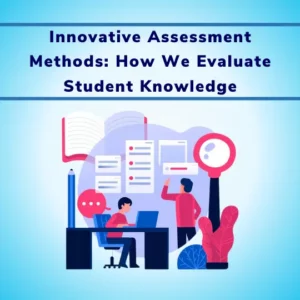Article Contents
Introduction
In the heart of India’s vibrant education landscape, a silent crisis unfolds each year as exam season approaches.
With over 1.5 million engineering aspirants and nearly a million medical hopefuls grappling for seats in prestigious institutions, the pressure to outperform not only peers but also one’s limits has become a herculean task.
Studies indicate that a staggering 74% of Indian students experience stress due to academic pressure, with exam season notably amplifying this phenomenon.
This relentless pursuit of marks, powered by a culture that often equates academic success with memorization skills, has steered the joy of learning off-course.
In today’s era of abundant information facilitated by the internet, the emphasis in education has shifted from memorization to application. Recognizing this shift, the central government and educational institutions are exploring innovative assessment methods such as Open Book Exams to promote deeper learning and practical application of knowledge.
Open Book Exams, as the name suggests, allow students to access their textbooks and other resources during the assessment process. Unlike traditional exams that primarily test memorization skills, Open Book Exams focus on evaluating students’ ability to understand, interpret, and apply the concepts they have learned.
The assessment methods in the recent years were focused on remembering the information. Now, with the availability of abundant information, it is important to shift the focus towards processing the information and finding the application of your knowledge.
This trend to encourage Open Book Exams can be seen in the recent decisions of various education regulatory bodies of India
- The CBSE is considering the implementation of Open Book Exams of class 9 to 12
- In order to understand the feasibility, the CBSE is planning pilot run before actual implementation
- Back in June, 2023, the government of Kerala has considered conducting Open Book Exams in select universities
- This shift in Memory based exams to competency based exam is governed by National Education Policy, 2020

Let’s explore how open book exams can be beneficial for the overall education sector and effective strategies to implement them.
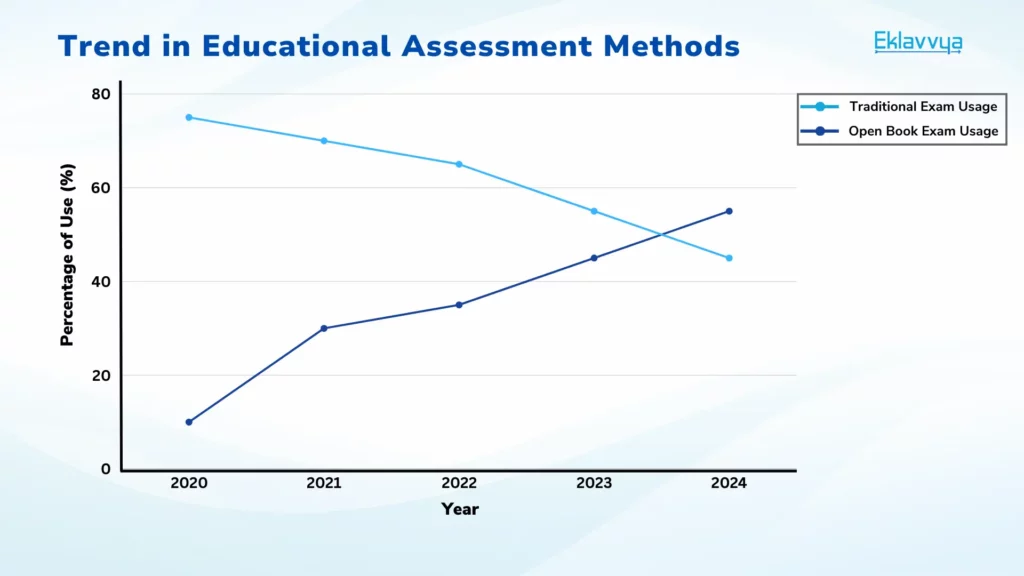
The transition towards Open Book Exams implies a broader movement towards application-based learning, where the emphasis lies not only on acquiring knowledge but also on utilizing it effectively in real-world scenarios.
By allowing students to use external resources, these exams encourage critical thinking, problem-solving, and information synthesis – skills that are essential for success in today’s dynamic and complex world.
The Essence of Open Book Exams
Unlike traditional exams that often emphasize memorization, open-book exams encourage students to understand concepts and apply knowledge effectively.
This approach mirrors real-world situations where resources are readily available, and the challenge lies in utilizing them efficiently. The essence of open-book exams is not the availability of resources but the ability to apply the information contained within them to solve complex problems.
Why Open Book Exams Matter
Open book exams are more than just an alternative assessment method; they are a preparation for real-life problem-solving where resources are not a limitation.
This form of examination encourages students to engage in research, enhance their critical thinking skills, and cultivate a lifelong learning attitude, which is indispensable for professional success.
Advantages Of Open-Book Exams
Open-book exams offer numerous benefits:
- They promote a better understanding of the material through application and analysis.
- They reduce exam stress, creating a healthier learning environment.
- They encourage collaborative learning and the development of research skills.
Comparison
| Title | Open Book Test | Traditional Test |
| Knowledge Retention | High | Lower |
| The focus of the Test | Knowledge Application | Memorization, Definitions, Formulas, etc. |
| Stress Levels for Student | Lower | Higher |
| Encourage Innovation | Yes | No |
| Employability Improvement for Graduates | Yes | Limited |

Furthermore, studies have shown that open-book exams lead to higher-order thinking and better long-term retention of knowledge. They provide an equitable platform for students with diverse learning styles and abilities.
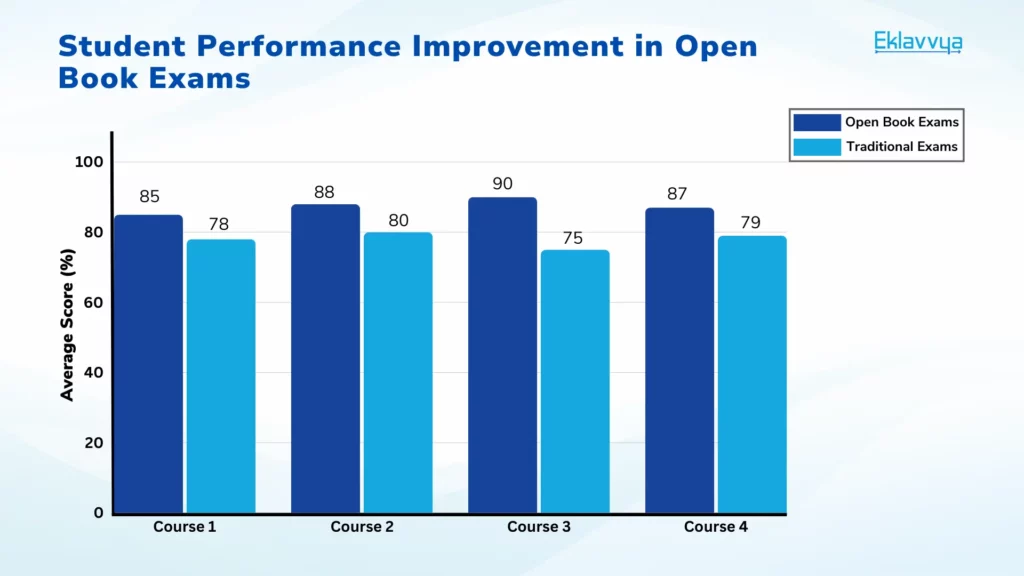
Implementation and Challenges
Implementing open-book exams requires clear guidelines on permissible materials, training for students on effective note-taking, and designing questions that test analysis, synthesis, and application.
The challenges include ensuring academic integrity and developing assessment criteria that focus on critical thinking. Leveraging technology can offer solutions to these challenges, ensuring effective monitoring and facilitation of exams.
Define the Learning Objective and Align it with the Open Book Test
For any academic course or subject, the learning objective should be clear for the institution. Based on the learning objective, an open-book exam should be set. While defining the question paper it is important to give weightage to practical application over memorization of the knowledge.
Training should be arranged for the examiners and teachers in this new methodology. Training programs should be conducted periodically to ensure that people involved in the examination activity are comfortable and confident while setting up a question paper according to the learning objective.
You can also use question bank management software to define questions according to the learning objective. Such software has many facilities including defining question papers according to difficulty level, timing, syllabus to be covered etc.
Take Feedback from Students After Open Book Tests
Feedback from the student community is a very critical step in this regard. Students can provide feedback to improve future open-book tests. Results of the open-book test can be analyzed to assess if they match the actual competencies of the student in the particular subject.
Using a continuous feedback mechanism process you can improve open book testing standards.
Technology to Conduct Open Book Test
While open-book tests can be conducted without technology, utilizing it will undoubtedly prove both scalable and beneficial. Technologies such as online question bank management or online examination management, including the ability to conduct descriptive exams with file upload capabilities, are available.
Students will be shown questions on the screen and must attempt to answer them by writing, typing, or using a specific tool. They then upload the output file associated with their answer for evaluation by examiners.
Online question banks and assessment technologies can help administer open book tests professionally and streamline candidate performance evaluations. Examiners at multiple locations can assess student performance concurrently without the need for physical presence at evaluation centres.
Additionally, online assessment tools offer facilities for conducting online viva and video assessments of candidates, recording their answers in the system for later evaluation.
Artificial intelligence is another available feature that can automatically evaluate descriptive answers from candidates.
This technology will undoubtedly improve the evaluation process and expedite it to ensure timely result declarations. Thus, technology can certainly assist in adopting, implementing, and executing open-book test methodologies for educational institutions.

The Road Ahead
The future of exams is leaning towards more practical and application-based assessments. Incorporating technology can create dynamic and interactive exam environments, preparing students for the complexities of the modern workforce and society.
Data shows a growing preference for open-book exams among educators and students alike, indicating a significant shift in educational assessment methods.
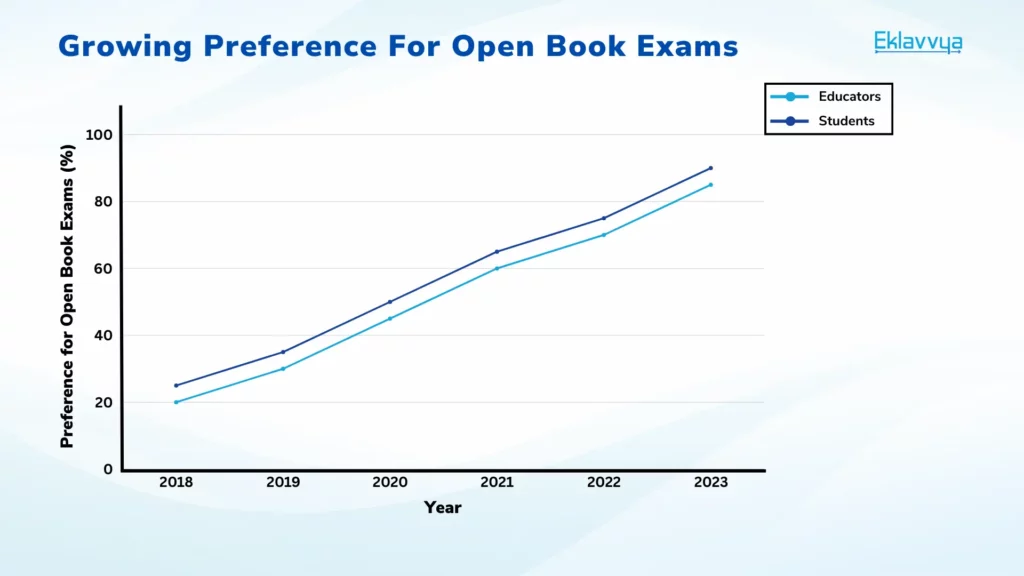
The CBSE Board Initiative to Conduct Open Book Tests
A testament to the growing acceptance of open book exams is the Central Board of Secondary Education (CBSE) in India, which has initiated a pilot run of open book exams in select schools in the year 2024.
This innovative step, aimed at evaluating student understanding and application of knowledge rather than rote memorization, represents a significant shift in educational assessment.
The CBSE’s move underscores the potential of open book exams to transform learning and assessment methods across the globe, making education more relevant and effective for the challenges of the 21st century.
This pilot program not only highlights the practical benefits of open-book exams but also paves the way for their wider adoption in educational systems worldwide.
A Look at the Numbers
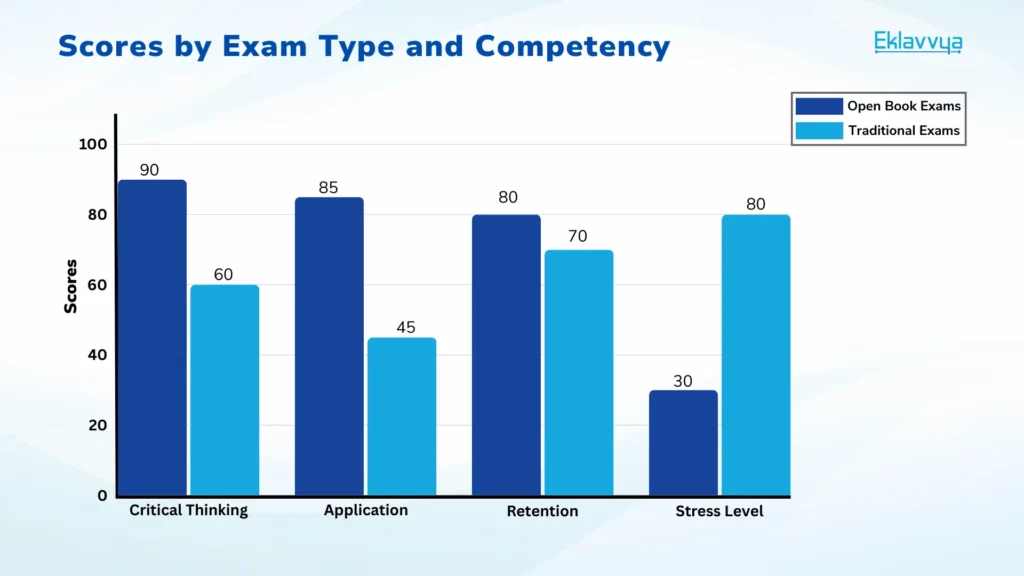
Open-book exams score better than traditional exams for various aspects like critical thinking, application, retention of knowledge and reduced stress levels. Evidence supports the efficacy of open-book exams. For instance, student performance in open book exams consistently surpasses that in traditional settings across various courses.
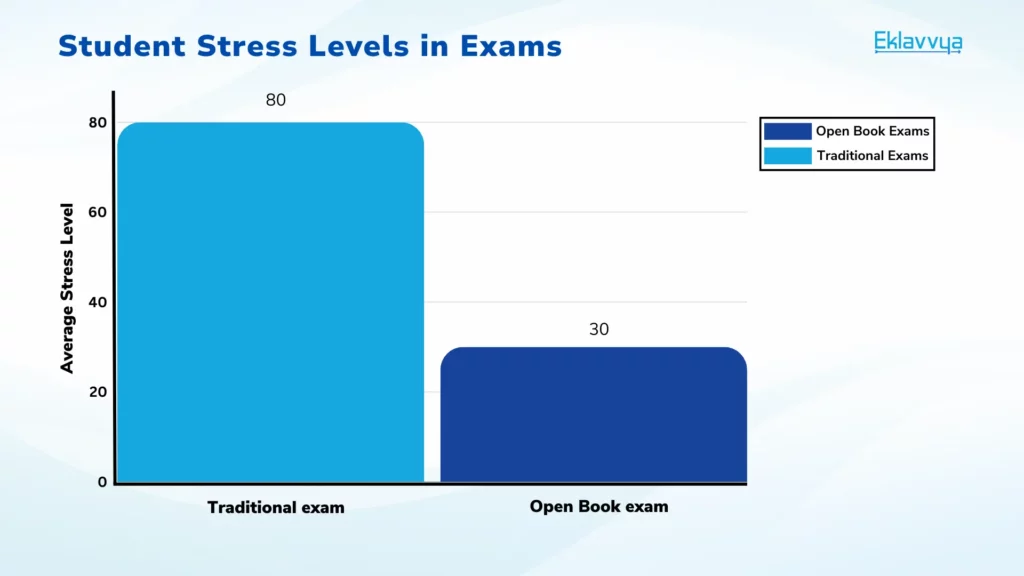
Stress levels are notably lower in open-book exams, and the preference for this type of assessment has been growing among both educators and students. Furthermore, long-term knowledge retention is higher after open book exams, underlining their effectiveness in education.
The Open book Exams provide a Stress free learning experience
What if I tell you that for a Mathematics exam, you don’t have to remember all the formulas? For the Biology exam, you don’t have to remember diagrams and figures of organs, wouldn’t that be great?
You get less stressed and can focus more on concepts than focusing on memorizing long formulas and diagrams.
This is scientifically studied at AIIMS Bhubaneswar, as per the study, most of the students agreed that the Open Book Exams were stress free as compared to conventional methods of examination Reference.
On the same note, 78.2 % of the students conveyed that the Open Book Examination was relatively more difficult than the conventional examinations.
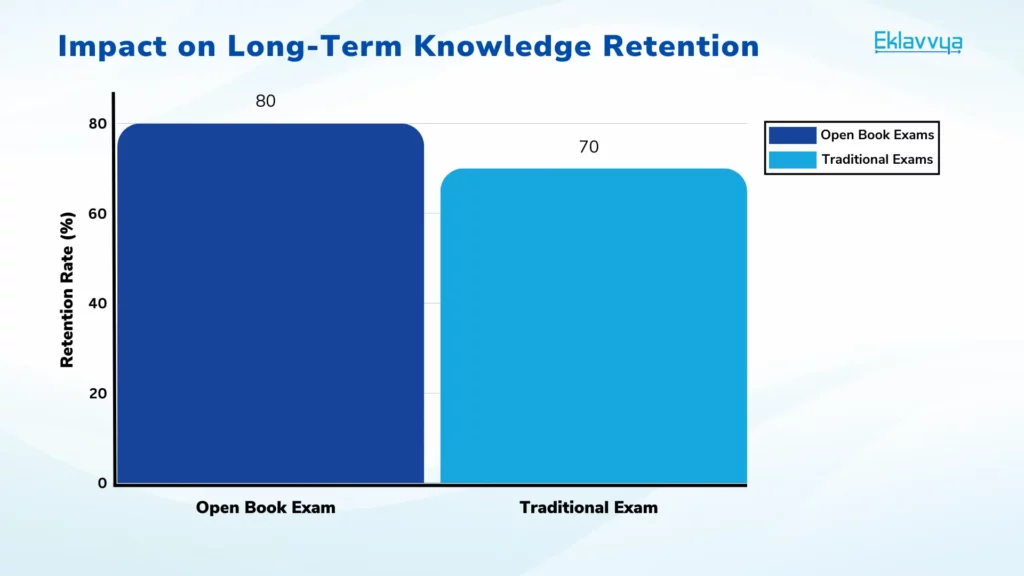
Open Book Exams make the students rely more on their textbooks than other non-reliable information sources
Textbooks are the primary source of information for learners, but with the advent of multimedia based learning, the students are relying more on non-standard sources like videos and short notes, presentations available on the internet.
However, as per the study published by Journal of Effective Teaching, the students who were about to undergo Open Book Exams preferred to study from the text books, promoting the thorough and reliable learning. Reference
Conclusion
Open book exams represent a forward-thinking approach in education, one that prioritizes understanding, application, and critical thinking over rote memorization.
As we move towards a future where adaptability and problem-solving are key, embracing open-book exams could be the catalyst for developing more competent, prepared, and resilient learners.
The journey ahead for education is one of transformation, and open-book exams are a pivotal part of this journey, promising a more inclusive, effective, and realistic assessment method for all students.
Open book exams allow students to access their textbooks and other resources during the assessment process, unlike traditional exams that primarily test memorization skills. They focus on evaluating students’ ability to understand, interpret, and apply concepts rather than rote memorization.
The shift towards open book exams signifies a broader movement towards application-based learning, emphasizing not only acquiring knowledge but also utilizing it effectively in real-world scenarios. It promotes critical thinking, problem-solving, and information synthesis – essential skills for success in today’s dynamic world.
Open book exams foster a deeper understanding of the subject matter, promote higher-order thinking skills, provide a more inclusive assessment environment, and reduce stress by eliminating the need for memorization. They also encourage reliance on reliable sources like textbooks and promote knowledge retention.
Effective design of open book exams involves crafting questions that require students to connect various concepts, encouraging holistic understanding. Emphasis should be on application-based questions, challenging students to apply their knowledge to real-world scenarios. Questions with multiple correct answers can promote individuality and creativity.
Yes, with the advent of novel assessment technologies, conducting online open book exams has become easier. Online platforms can facilitate the administration of open book exams while maintaining integrity and security. This opens up opportunities for a more dynamic and inclusive educational experience.


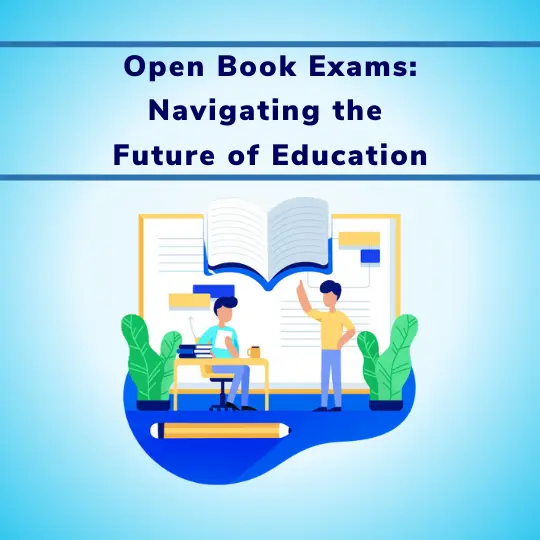

![How Government-Led Exams at 250+ Locations Are Setting New Standards of Integrity [Case Study]](https://www.eklavvya.com/blog/wp-content/uploads/2024/04/Enhancing-Exam-Integrity-Government-Certification-in-250-Locations-150x150.webp)
![Transforming Central Govt. Exams Evaluation: How Onscreen Marking is Leading the Charge [Case Study]](https://www.eklavvya.com/blog/wp-content/uploads/2024/04/How-Onscreen-Marking-Revolutionized-Central-Govt-Exams-Case-Study-1-150x150.webp)
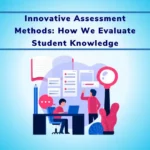
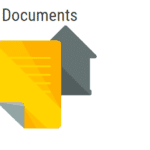
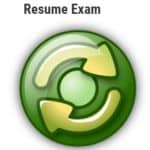
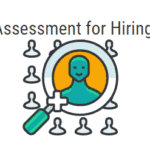
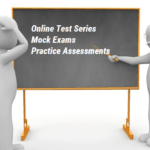








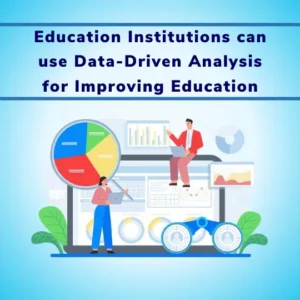

![How Onscreen Marking Revolutionized Central Govt Exams [Case Study]](https://www.eklavvya.com/blog/wp-content/uploads/2024/04/How-Onscreen-Marking-Revolutionized-Central-Govt-Exams-Case-Study-1-300x300.webp)
